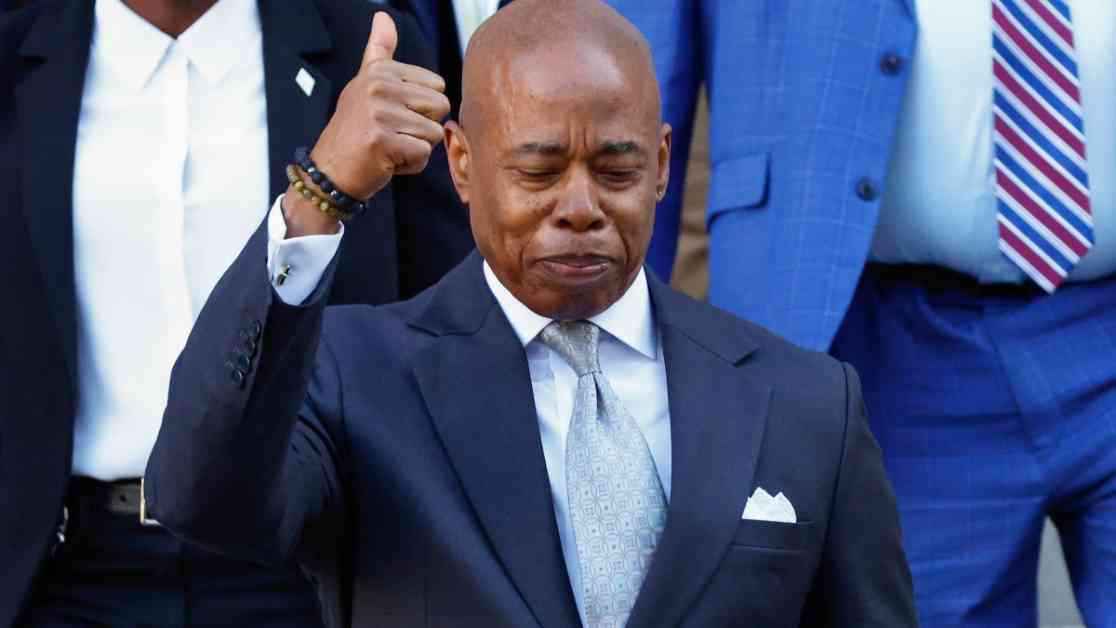New York City Mayor Eric Adams Faces Uncertain Future Amid Quid Pro Quo Allegations
New York City Mayor Eric Adams is in the eye of a political storm as his own party pressures him to step down after the Justice Department decided to drop the federal corruption charges against him. This unprecedented move has fueled speculation that Adams may be entangled in a quid pro quo scenario, creating a cloud of doubt over his leadership.
The controversy began when Manhattan’s top federal prosecutor, Danielle Sassoon, resigned, along with other DOJ officials, after refusing to dismiss corruption charges against Adams. This bold stand underscored the Justice Department’s concern over political interference in criminal cases, particularly those involving high-profile figures like Mayor Adams. Despite vehemently asserting his innocence, Adams now finds himself at the center of a political maelstrom that threatens his position.
The Fallout and Backlash Against Eric Adams
The fallout from the Justice Department’s decision has been swift, with public officials, including some who are vying for Adams’ seat in the upcoming primary, demanding his resignation or removal from office. The city comptroller, Brad Lander, expressed his dismay, labeling Adams’ predicament as “sad, embarrassing, and enraging.” This sentiment was echoed by Scott Stringer, another mayoral candidate, who likened Adams’ situation to a “hostage situation,” highlighting the gravity of the allegations.
The chorus of disapproval against Adams swelled further when Rep. Alexandria Ocasio-Cortez joined the fray, accusing the mayor of jeopardizing the city’s welfare to evade charges. Her call for Adams’ resignation was echoed by Rep. Nydia Velazquez, underscoring the growing sentiment that Adams’ continued tenure poses a risk to New York City.
The Political Landscape and the Governor’s Response
As the controversy deepens, Lieutenant Gov. Antonio Delgado became the most prominent state official to demand Adams’ resignation, signaling a widening rift within political circles. Governor Kathy Hochul’s response to the allegations has been measured, acknowledging the seriousness of the accusations but refraining from making hasty decisions. In an interview with MSNBC’s Rachel Maddow, Hochul emphasized the need for a thorough assessment of the situation before taking any definitive action.
The Question of Removal: Legal Precedents and Possibilities
The prospect of removing Mayor Adams from office raises complex legal questions, given the rarity of such actions in New York City’s history. While Hochul holds the authority to present charges against Adams and initiate his removal, the process remains uncharted territory, with only two mayors having resigned in the city’s history. The option of declaring Adams “unable for office” presents another avenue for his removal, albeit with stringent criteria that must be met.
Council Member Tiffany Cában’s call for immediate action by the Committee on Mayoral Inability underscores the urgency of the situation. However, the likelihood of successfully removing Mayor Adams remains uncertain, given the legal and political challenges involved.
In the midst of this political turmoil, Mayor Eric Adams finds himself at a crossroads, with his future hanging in the balance. As the city grapples with the fallout from the quid pro quo allegations, the path forward remains fraught with uncertainty, leaving New Yorkers and the nation watching closely for the next chapter in this unfolding saga.


